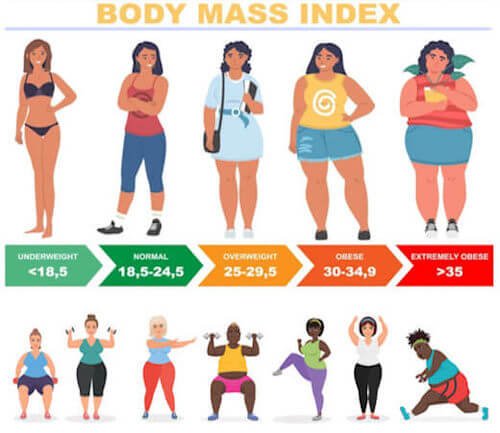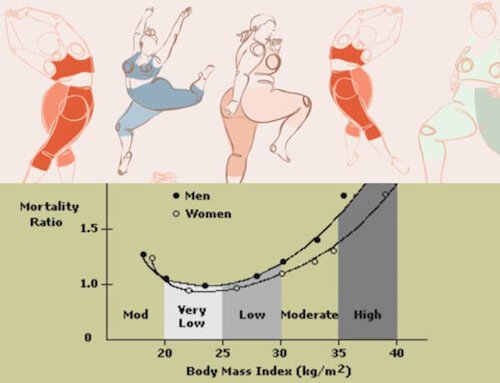Remarkably meticulous folks have gathered in our company. Understandably so, considering their high level of activity.
They come to me with various questions.
For example:
How can overweight affect their lifestyle? Are there any studies on this topic, and what are the results?
They insist that it’s important to them. They want to know what to expect if they gain overweight.
Searching online about overweight and lifestyle yielded discouraging results. Turns out, this is a serious issue in the USA.
There’s a lot of research on how a person’s overweight impacts various aspects of their life. And there are quite a few programs aimed at weight reduction.
WHO has a definition:
“Overweight and obesity are defined as abnormal or excessive fat accumulation that presents a risk to health. A body mass index (BMI) over 25 is considered overweight, and over 30 is obese.”
(World Health Organization)

The key phrase is “a risk to health“.
And it was surprising for me to learn that it’s also considered a “chronic condition“.
(National Institutes of Health)
The research results shed light on how being overweight impacts many aspects of everyday life.
Here is a clear breakdown
First off, being overweight affects physical health.
It increases the risk of developing type 2 diabetes, heart disease, and high blood pressure. There’s even a possibility of certain types of cancer.
Lorem ipsum dolor sit amet, consectetur adipiscing elit. Ut elit tellus, luctus nec ullamcorper mattis, pulvinar dapibus leo.
It also takes a toll on mental health.
Turns out, folks with extra pounds are more prone to depression and anxiety. Studies show they often suffer psychologically, experiencing lower self-esteem.
(Source: Harvard T.H. Chan School of Public Health)

Sadly, overweight individuals may face social stigma and discrimination, which seriously hampers their social interactions and relationships.
Weight discrimination is present in education, employment, and the workplace, among other areas.
(Sutin A.R., Terracciano A. Perceived weight discrimination and obesity. PLoS One. 2013;8(7):e70048.)
Being overweight diminishes overall quality of life.
It can interfere with everyday activities. Even simple tasks like climbing stairs or doing chores around the house can be exhausting.
Fatigue and sluggishness further limit mobility and make daily tasks harder to accomplish.
Limited mobility may lead to dependence on others for assistance, reducing motivation for social interactions, which can deepen feelings of alienation and isolation.

Overweight increases both direct and indirect expenses.
Objectively, healthcare costs rise. There are limitations on job choices, and earning potential decreases.
This is a significant economic burden for families and individuals.
Excess body weight requires constant lifestyle modifications.
These should include dietary changes, consistent monitoring of physical activity, and behavior adjustments.
Prevention and intervention. Obesity fighting strategies.
Summary from sources.
Prevention can target individuals, diverse communities, and policymakers.
It all boils down to three strategies.
It includes promoting a healthy lifestyle, creating suitable environments, and implementing evidence-based interventions.
What happens at the individual level?
At the individual level, recommendations are given for healthy eating, physical activity, and behavioral factors.
Educational campaigns are conducted on healthy eating. It could include teaching about balanced diets and portion control.
Recommendations for consuming vegetables, fruits, and lean proteins are made.
Suggestions are made to reduce the consumption of high-sugar products (beverages).
Information is provided on the harm of excessive consumption of processed foods high in fat.
For example:
According to the Dietary Guidelines for Americans, sugar intake should not exceed 10% of daily calorie consumption.
So, if you are on a 2000-calorie diet, that’s roughly 12 teaspoons of sugar (200 calories).

Quote:
“Ultra-processed foods currently make up nearly 60% of what the typical adult eats, and nearly 70% of what kids eat.”
“And a large and growing body of evidence has consistently linked overconsumption of ultra-processed foods to poor health outcomes.”
(What we know about the health risks of ultra-processed foods)
And this quote is a continuation of the previous one (as I understand it):
“Four of the top six killers are related to an inadequate diet, which in the U.S. is probably largely due to convenient, safe, inexpensive food that we eat too much of.“
(Christopher Gardner, the director of nutrition studies at Stanford University)
Approaches based on communities
Communities are local governments, healthcare providers, businesses, schools, and community organizations.
These communities make a significant contribution to preventing and combating obesity.
Let me just list some of their activities:
• Creating an environment to support a healthy lifestyle.
• City policies focus on pedestrians, cycling, and recreational areas for physical activities.
• Farmers’ markets for healthy food.
• School health programs on dietetics and physical education.
• Partnering with parents and teachers to promote healthy behavior in and out of the classroom.

What can policymakers do?
They need to ensure systemic changes are made. Changes that should be aimed at the health of the entire population.
Address the root causes of obesity.
It might include:
• Regulating the marketing and advertising of unhealthy products and beverages.
• Promoting the production and consumption of healthy foods.
• Implementing beneficial nutrition standards in childcare facilities and schools.
Support urban planning and transportation infrastructure conducive to walking and cycling.
Organizing events aimed at reducing car dependence.
Implement tax strategies targeting sugar-sweetened beverages.
Subsidies for healthy food products.
Preventive Measures Based on Scientific Knowledge
There is such a society.
Positions itself as a scientific membership organization combating obesity.
Research on the causes and prevention of overweight is conducted on a scientific basis.
The Obesity Society Governing Board
In the recent past, one of the large-scale programs was conducted – National Diabetes Prevention Program (NDPP).
This program was developed by the Centers for Disease Control and Prevention (CDC)

The program was aimed at preventing type 2 diabetes among people at high risk, people with overweight.
Program participants were required to make lifestyle changes.
You can read more about it here.
The results were impressive.
Changes in eating habits and increased physical activity led to significant weight loss and a reduced risk of developing type 2 diabetes.
High Obesity Program (HOP), 2023 – 2028
The HOP program is launched in counties where more than 40% of adults are affected by overweight.
Link to the Program
State Physical Activity and Nutrition (SPAN) Program, 2023 – 2028
The strategy is to eliminate the dependence of health status on poor nutrition, low physical activity, and overweight.
The goal is to support the health of all Americans.
Emphasis is placed on people with chronic diseases and normal development in early childhood.
The Program is available here.

Family Healthy Weight Programs (FHWP)
The program is aimed at families to change their lifestyles.
Focused on nutrition, physical activity, and behavioral change.
The program is flexible and can be adapted to the cultural context and needs of the family.
Find out more here.
You can read about the success stories of some programs:
They tell about the work of state and local programs.
Programs were aimed at nutrition, promoting physical activity, and a healthy lifestyle.
Lots of interesting stories here.
I hope I have provided enough material for reflecting on the issue of overweight and lifestyle.
Additionally, there is a post on the website: “The effect of physical activity on weight management“
You can read its contents by following the link:

